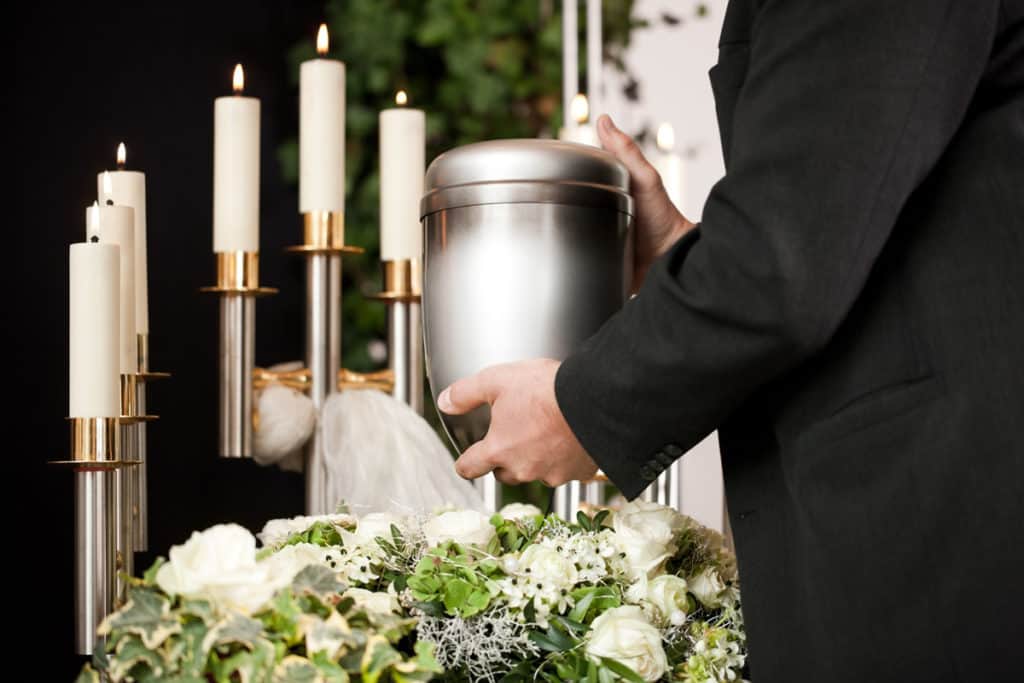Arranging a funeral or cremation in Iowa
Arranging a funeral can be challenging, especially as you are usually grieving and feeling emotionally vulnerable at the same time, and this can mean making decisions is not easy. This brief guide to arranging a funeral or cremation in Iowa aims to provide a starting point and give you an overview of some of the main things you need to consider. State laws relating to funeral services differ by state, so we have tried to provide an overview of how Iowa laws govern the purchase of funeral products and services.
Choosing a funeral home in Iowa
One of the first things you will need to do, especially if a death has just occurred, is choose the funeral director you wish to handle the funeral services. There are in the region of 700 funeral homes and mortuaries in Iowa so you need to consider what criteria can help you select the right funeral home for your needs. Do you require a traditional funeral or burial service? Or are you seeking a more contemporary life celebration service, or a cremation? Is the cost of the funeral an issue, are you working to a tight budget and looking to save money where you can on funeral expenses? Obviously having some clear ideas of what you do need from a funeral home helps you make the decision of which funeral home is right for you.
Many people seek recommendations or referrals from family or friends, and this is a very good way to get information. However, if you are not in a position to benefit from a sound referral, or you are seeking something specific, you may have to resort to contacting funeral homes yourself. Usually people look for a reputable funeral business in their own area, but it is always advisable to check with more than one funeral home and compare services and prices for a funeral or cremation.

What does an average funeral cost in Iowa?
The average cost of a funeral in the U.S. is $7,848 (according to the NFDA – National Association of Funeral Directors 2021), and this does not include any cemetery fees. Depending upon the funeral services provider you select, and the range of ancillary services, a funeral in Iowa can cost anything from $3,700 [excluding cemetery costs]. Managing some of the more expensive items, such as the casket, and looking at more affordable options, can help you save money on funeral costs.
All funeral homes in Iowa must have a general price list (GPL) that outlines their service charges and funeral merchandise prices. They must provide a copy of their GPL when they quote you a price according to the Federal Trade Commission’s ‘The Funeral Rule’.
It is recommended that you DO compare like-for-like, and shop around and compare funeral prices between more than one funeral home. That way you can be sure that you have a “best value” funeral service.
What does a cremation cost in Iowa?
A typical cremation funeral service will cost in the region of $3,200 (depending upon the ancillary services/products you select). This is the type of cremation service that replaces a full traditional funeral. It is possible to arrange a cremation for considerably less than this.
Arranging cremation services in Iowa
Cremation is fast-becoming the preferred option in Iowa now, and in Des Moines and Iowa City the cremation rate is almost surpassing 50%. In order to arrange a cremation, a cremation authorization form MUST be signed by the next of kin, so that a cremation permit can be issued. There is no mandatory waiting period for cremation in Iowa, although Iowa law states that the deceased must be cremated or embalmed within 48 hours of the death.
Arranging a direct cremation in Iowa
A direct cremation is the least expensive cremation option for families. A direct cremation means that there are no services, the cremation goes ahead once all the documentation has been completed and then the cremated remains are returned to the family in a temporary container. Incremental options, such as a private family viewing or an upgraded cremation urn, can be added to a basic direct cremation package for an additional fee.
The DFS Memorials providers in Iowa offer low cost cremation services and affordable burial services. All DFS Memorials providers guarantee to offer a ‘best value’ direct cremation package.

How do I decide between a burial or a cremation in Iowa?
The decision between choosing a burial or cremation is very much a personal choice. The deceased may have left explicit wishes or surviving family may have to make a decision. Faith and/or funds for the funeral service can play a significant role in whether a burial or cremation is chosen. Having a pre-existing cemetery plot can be an important aspect as burial plots can be quite expensive to purchase these days. Cremation is certainly on the increase in the United States, and is becoming a popular funeral alternative for many now. Green burials are also another option that can be considered.
If you are unsure whether to choose between burial or cremation, talk to family and friends, and discuss the decision with your funeral director.
What can I do with the cremated remains after a cremation in Iowa?
You have several options about what you do with cremated remains. The cremated remains are returned to you in a cremation urn and you may keep the cremated remains at home in the urn or have the urn interred in a niche, mausoleum or existing grave plot. You can also have the cremated remains divided between a number of keepsake urns, if several family members wish to keep some of their loved one nearby.
Ash scattering is another option. You can scatter cremated remains on private land (with the consent of the landowner) and you can scatter in many public areas, so long as you use common sense guidelines. You may need to check if any permit or authorization is required to scatter cremated remains in state parklands and other municipal grounds.
Does the deceased have to be embalmed?
There is no legal requirement, or Iowa law, stipulating that you have to have the deceased embalmed. However, some funeral homes may adopt policies that insist upon embalming if a public viewing or service is being held with the deceased in repose. Iowa is one state that upholds a law that stipulates a body must be buried or cremated within 48 hours or embalming is required. [Code 645-100.6(4)] For some reason Iowa is one of a minority of states that do not allow refrigeration as an alternative to embalming. However, if you proceed with a timely funeral, you can eliminate the need for embalming (and it can just be another fee to add to your funeral costs!)
Home Funerals – Do I have to employ a funeral director in Iowa?
Although Iowa is not listed as a state that prohibits family from taking care of their own dead, it appears that Iowa law requires that a funeral director remove the deceased from the place of death. From what I can gather this refers to the fact that a burial-transit permit is generally only issued to a licensed funeral director. This does mean you can still conduct your own home death care but you may need the services of a funeral director to obtain the necessary transit permit to move the deceased to the church/cemetery/crematory.
Purchasing a casket or grave marker in Iowa
It is legal in Iowa to purchase a casket from elsewhere than your funeral home, and your funeral home MUST accept it without a surcharge. Often you can make a significant saving by purchasing a casket from a third-party seller. Generally, a grave marker is not erected until some months after the burial [this is to allow the ground to settle]. Therefore you do not have to purchase one immediately, or from the funeral home/cemetery, at the time of making funeral arrangements.
To find out more about your options for buying a casket, or purchasing a headstone, visit our comprehensive sections on Caskets and Grave Markers. I would recommend you visit these sections for more detailed information.

Can I pre-plan a funeral/ cremation in Iowa?
Pre-planning your funeral alleviates family of both the difficult decisions and the financial burden of funeral expenses. You can preplan a funeral in Iowa by making funeral arrangements direct with a funeral home with a preneed funeral contract or purchase burial insurance.
What you DO need to consider is that funeral prices could indeed be coming down. Funeral companies promote preplanning on the basis that it “locks into today’s prices”, but with the cremation trend increasing, and more funeral homes competing for the ‘affordable’ funeral market – the reality is that the funeral costs are not as ‘fixed’ as they once were.
Another funeral planning alternative is to document your wishes and put aside the appropriate funds in a POD Payable on Death account or a Totten Trust. This enables family to access the funds at the time of need and make the funeral arrangements, but you keep in control of your monies and any accrued interest. Read more in our article ‘What is my best and safest option for putting aside money for a funeral’.
Can I donate my body to science in Iowa?
Yes, donating your body to science can be a great way to facilitate your end-of-life needs. Most of the national organizations that deal with full body donation handle everything from the moment you notify them of the death, including collecting the body, the donation, the free cremation and the return of the cremated remains to the family a few weeks later. Check out our Body Donation section for further information. Des Moines University and the University of Iowa both have body bequeathal programs.
How can I transport a loved one either back to, or from, Iowa after death?
If a loved one needs to be transported back to a state or country of origin following their death, you will need the services of a funeral director who can arrange funeral shipping for you. This generally requires a funeral professional who can coordinate arrangements at the place of death and wherever the body is being shipped to.
If transporting a loved one between states in the United States you have the option of flying the body, or transporting the body by land. Certain regulations do apply on moving a body, and it is likely that embalming will be required as well as specific containers to hold the casket. Shipping a body can be quite expensive, so the other alternative you have is to have the body cremated at the place of death, and then transport back the cremated remains. Visit our section on Funeral Shipping to read more.

Who should I contact if I have a complaint about a funeral home in Iowa?
Funeral professionals are very dedicated in their vocation; however, it does sometimes happen that you may have a complaint or grievance with a funeral home and you do not manage to resolve it directly with the funeral director. Iowa Board of Public Health’s Board of Mortuary Science licenses funeral establishments and professionals, and they may be able to assist you with a complaint against a licensed funeral establishment. They can be reached at: Lucas State Office Building, 321 E. 12th Street, Des Moines, IA 50319 Phone (515) 281-4287
I hope this guide has helped to answer some of your immediate questions. Please check out our Library/info section for our full catalogue of resources to help you through the process of arranging a funeral. Feel free to contact us if we can be of any assistance with any further questions you may have.
Resources:

